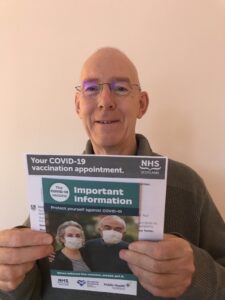It’s not such a Blue Monday!
 The colours for our Generation Scotland logo were carefully chosen – the darker blue of Scotland’s national colours and the paler blue of our national health service. But blue has other connotations.
The colours for our Generation Scotland logo were carefully chosen – the darker blue of Scotland’s national colours and the paler blue of our national health service. But blue has other connotations.
In music, the blues are rooted in the pain and persecution of slavery and poverty, and the pain of lost love and loved ones. In medicine, the baby blues are shorthand for the severe depression felt by many young mothers, which sadly can follow the joy of a new birth. More generally, the blues is a common term for depression.
 Many will have headed into the Christmas period feeling more blue than festive. Just when we thought we were heading for a ‘back-to-normal’ festive season, the Omicron variant swept across the UK. The frighteningly rapid increase in Covid-19 case numbers in December 2021 thwarted well laid plans at the last minute. However, borrowing from the lyrics of Ian Dury and the Blockheads, there are “Reasons to be cheerful, one, two, three.”
Many will have headed into the Christmas period feeling more blue than festive. Just when we thought we were heading for a ‘back-to-normal’ festive season, the Omicron variant swept across the UK. The frighteningly rapid increase in Covid-19 case numbers in December 2021 thwarted well laid plans at the last minute. However, borrowing from the lyrics of Ian Dury and the Blockheads, there are “Reasons to be cheerful, one, two, three.”
One, the number of Covid-19 hospitalisations has stayed well below the numbers we witnessed this time last year. Two, it does seem that the Omicron variant is much less serious than Delta. Three, if you are already vaccinated a booster jag gives very good protection.
Maybe we are on the turning point from a life-threatening pandemic to a manageable level of endemic infection. Perhaps Blue Monday won’t be so blue this year or next.
I looked into the origin of Blue Monday. It appeared in 2005 and was originally a marketing gimmick from a UK travel company. According to a scientific-looking mathematical formula, the third Monday in January was claimed to be the most depressing day of the year. The perfect time to book your summer holiday as a ‘pick me up’!
The formula might look impressive, but it really doesn’t stand up to even superficial scientific scrutiny. In a world of ‘fake news’, who can you trust? Can you trust the ‘fact checkers’? Trust at a time of crisis is vital. Trust that our elected officials will have our best interests at heart. Trust that the NHS will have the resources to provide the best care possible to one and all. Trust and trustworthiness are at the core of our democracy. Trust in your doctor has always been high.
 Trust in science has increased during the pandemic, thanks to vaccines, new medicines and robust scientific formulas from the modellers. They have done a remarkable job of predicting likely case numbers at every turn. It is however a bit like the weather forecast. They get it pretty much right nearly all of the time, but are pilloried on the rare occasions when they don’t. It is not the job of modellers (whether of infection or the weather) to say when and how to act. That is the job of government. It’s a tricky balancing act between protecting us and the NHS, our children and young adults’ education, and the wider economy.
Trust in science has increased during the pandemic, thanks to vaccines, new medicines and robust scientific formulas from the modellers. They have done a remarkable job of predicting likely case numbers at every turn. It is however a bit like the weather forecast. They get it pretty much right nearly all of the time, but are pilloried on the rare occasions when they don’t. It is not the job of modellers (whether of infection or the weather) to say when and how to act. That is the job of government. It’s a tricky balancing act between protecting us and the NHS, our children and young adults’ education, and the wider economy.
Trust must be earned and is easily broken. It is fragile and vulnerable to vocal minorities, no matter how outlandish and flawed their claims and arguments. Fake news travels every bit as fast as Omicron. Like Omicron, it takes a lot of concerted effort to stop and snuff out.
For Generation Scotland, trust and trustworthiness are part of our core values. We are forever grateful for your trust in us to treat the information you share with respect, to keep it safe and secure, and to only use it for approved health research.
Let me end on that note and wish you all a Happy New Year. We’re looking forward to better times in 2022!

Generation Scotland team – October 2021




Recent comments